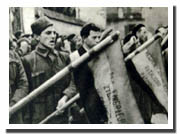Spain Travel & Tourism Guide
NextGen Day feature Africa links, Africa resources and large selection of Africa budget airlines, Africa chartered planes, Africa sea cruises, Africa ferries, Africa travel agencies, Africa land transports and Africa attractions including Africa beaches, Africa medical tourism, Africa retirement homes, Africa historical and Africa pilgrimage tours. NextGen Day offers travel tips and information for top travel places and best destinations in Africa, Asia, Australia, Europe, Middle East and United States of America.
Spain History - 20th Century
|
The 20th century brought little peace; Spain played a minor part in the scramble for Africa, with the colonisation of Western Sahara, Spanish Morocco and Equatorial Guinea. The heavy losses suffered during the Rif war in Morocco helped to undermine the monarchy. A period of authoritarian rule under General Miguel Primo de Rivera (1923-1931) ended with the establishment of the Second Spanish Republic. The Republic offered political autonomy to the Basque Country, Catalonia and Galicia and gave voting rights to women.
The bitterly fought Spanish Civil War (1936-39) ensued. Three years later the Nationalist forces, led by General Francisco Franco, emerged victorious with the support of Nazi Germany and Fascist Italy. The Republican side was supported by the Soviet Union and Mexico and International Brigades, including the American Abraham Lincoln Brigade, but it was not supported officially by the Western powers due to the British-led policy of Non-Intervention. The Spanish Civil War has been called the first battle of the Second World War; under Franco, Spain was neutral in the Second World War though sympathetic to the Axis. The conflict had claimed the lives of over 500,000 people and had caused the flight of up to one half-million more citizens.
The only legal party under Franco's regime was the Falange española tradicionalista y de las JONS, formed in 1937; the party emphasised anti-Communism, Catholicism and nationalism. Nonetheless, since Franco's anti-democratic ideology was opposed to the idea of political parties, the new party was renamed officially a National Movement in 1949.
After World War II, Spain was politically and economically isolated, and was kept out of the United Nations until 1955, when due to the Cold War it became strategically important for the U.S. to create a military presence on the Iberian peninsula, next to the Mediterranean Sea and the Strait of Gibraltar, in order to protect southern Europe. In the 1960s, Spain registered an unprecedented economic growth in what was called the Spanish miracle, which rapidly resumed the long interrupted transition towards a modern industrial economy with a thriving tourism sector and a high degree of human development.
Upon the death of General Franco in November 1975, Prince Juan Carlos assumed the position of king and head of state. With the approval of the new Spanish Constitution of 1978 and the arrival of democracy, the State devolved autonomy to the regions and created an internal organization based on autonomous communities. In the Basque Country, moderate Basque nationalism coexisted with a radical nationalism supportive of the separatist group ETA.
On 23 February 1981, rebel elements among the security forces seized the Cortes and tried to impose a military-backed government. However, the great majority of the military forces remained loyal to King Juan Carlos, who used his personal authority and addressed the usurpers via national TV as commander in chief to put down the bloodless coup attempt.
On 30 May 1982, NATO gained a new member when, following a referendum, the newly democratic Spain joined the alliance. Also in 1982, the Spanish Socialist Workers Party (PSOE) came to power, representing the return of a left-wing government after 43 years. In 1986, Spain joined the European Community - what has now become the European Union. The PSOE was replaced in government by the Partido Popular (PP) after the latter won the 1996 General Elections; at that point the PSOE had served almost 14 consecutive years in office.
The Government of Spain has been involved in a long-running campaign against the separatist and terrorist organization ETA ("Basque Homeland and Freedom"), founded in 1959 in opposition to Franco and dedicated to promoting Basque independence through violent means. They consider themselves a guerrilla organization while they are listed as a terrorist organization by both the European Union and the United States on their respective watchlists. The current nationalist-led Basque Autonomous government does not endorse ETA's nationalist violence, which has caused over 800 deaths in the past 40 years.
Source: Wikipedia Encyclopedia

Spain hotels
<1> <2> <3> <4> <5> <6> <7> <8> <9> <10>
<11> <12> <13> <14> <15> <16> <17> <18> |
|
|

Travel Quotes: A good traveler has no fixed plans, and is not intent on arriving. Lao Tzu
All journeys have secret destinations of which the traveler is unaware. Martin Buber
|
Austria, Croatia, Cyprus, France, Greece, Hungary, Iceland, Iceland, Italy, Malta, Netherlands, Norway, Poland, Portugal, Romania, Russia, Scotland, Slovakia, Slovenia, Spain, Sweden, Switzerland, Ukraine
|
ADVERTISEMENT
|



